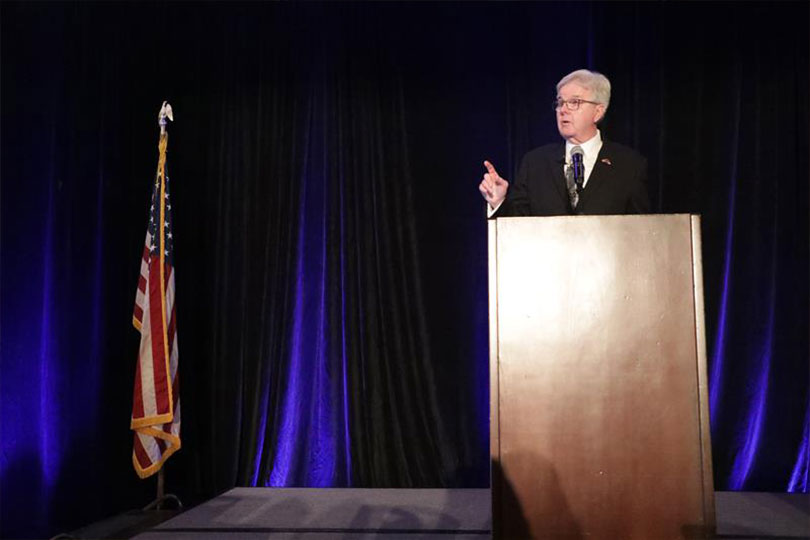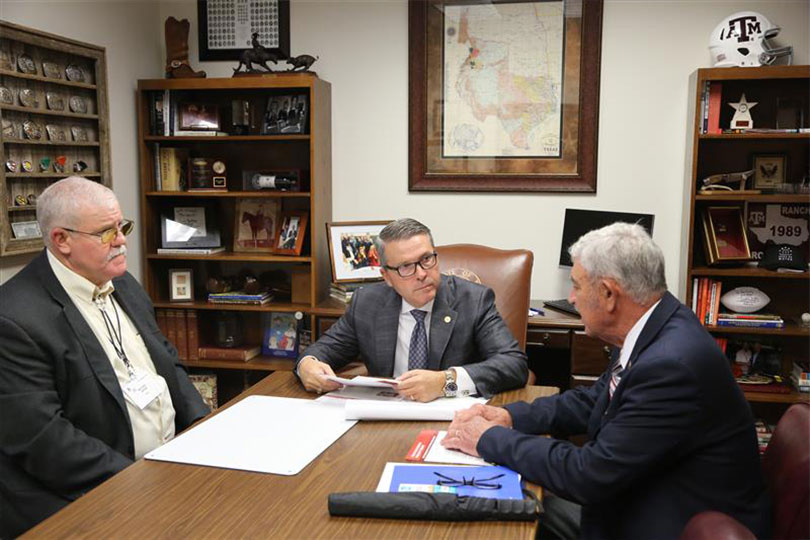By Shelby Shank
Field Editor
Conversations about the right to farm, truth in labeling and feral hog control echoed through the halls and offices at the state Capitol as Texas Farm Bureau (TFB) members met with state lawmakers in February.
More than 300 farmers and ranchers attended the TFB Leadership Conference, which focused on constituents bringing their legislators’ attention to TFB’s legislative priorities.
“Our organization has a reputation for professionalism and integrity at the state Capitol,” TFB President Russell Boening said. “It has been earned by the many years of our good work in Austin. Our influence at the Capitol derives from that reputation. We fight the good fight. We defend our policy with passion. But we do it in a way that is productive and respectful.”
At the conference, members heard from lawmakers, speakers and panelists on right to farm, truth in labeling, tax abatements and other priority issues addressed in TFB policy.
“It is our efforts now and in the future that make the biggest impression and have the greatest influence,” Boening said. “And here’s the bottom line, you’re taking care of business. We have excellent staff that do a tremendous job, but your personal involvement puts an exclamation point on our efforts. Remember that no voice is louder to an elected official than that of a constituent.”

Lt. Gov. Dan Patrick spoke at the conference. He outlined his legislative priorities for the regular session, including funding for law enforcement to ensure the same level of safety in rural Texas as urban areas, having more mental healthcare facilities available to rural Texans and budgeting for a pay increase for rural Texas school teachers to make the same amount as educators in urban areas.
“America can’t be strong without a strong Texas,” Patrick said. “We have to keep rural Texas strong.”
Patrick gave his full support over TFB priority issues and fighting back on the Biden administration’s new Waters of the U.S. (WOTUS) rule. The lieutenant governor expressed the high priority for right to farm legislation to pass and touched on protecting private property rights.
“I’m always honored to be with you. You’re a great organization and pleasant to work with,” Patrick said. “You never ask for a lot. You just ask to be treated fairly. You ask for the opportunity to grow your business and protect your family.”
Rural broadband and water supply
There are over 3 million Texans who do not have access to broadband internet.
“Broadband is no longer a luxury,” said Rep. Trent Ashby, who addressed TFB members during the conference. “It is an absolute necessity, no matter what your zip code is across our 254 counties in Texas. Everybody relies on internet at some level.”
Ashby addressed the challenges rural Texans face without adequate internet access and provided details of his rural Texas broadband initiative.
“The internet is going to drive many of our decisions, our jobs, the technology that’s in our farm equipment. For years, rural lawmakers have been working in Austin to try to move the needle on having a better-connected rural Texas,” he said.
Last session, HB 5, authored by Ashby, implemented a statewide broadband plan and developed a map of the state, down to the household level, that shows who has internet access and who doesn’t. This map will assist funding programs that will bring broadband across rural Texas.

Sen. Charles Perry also covered rural broadband in his priority issues for agriculture and rural Texas.
“Reality is, you have to have connectivity in rural Texas to make a call in Houston,” he said.
Perry discussed a bill he has filed that will provide funding for the Texas Universal Service Fund and rural broadband by dedicating revenues from an existing tax that will guarantee funding for 10 years. The bill has the potential to add about $500 million for broadband development across the state each year
Along with his broadband initiative, Perry discussed Texas’ water supply.
“We have to start talking about water today,” Perry said.
With a growing population and limited water supply, there’s a need to address water rights and the development of water supplies in Texas. Perry’s bill aims to establish a fund that would plan for the future.
“It’s expensive, and it’s long term. It would establish a fund that would allow private sectors to leverage opportunities to go out and acquire water from other states that have said they are willing to sell us water,” he said.
Panelist and presenters
Conference attendees also heard from several speakers, including Texas Land Commissioner Dawn Buckingham and a panel with TFB legislative staff on TFB priority issue updates.
Gregg Doud, vice president of Global Situational Awareness and chief economist for Aimpoint Research, provided information on U.S. agricultural trade. He shared 2021 and 2022 agricultural trade data by country and spoke about global crop and livestock imports and exports, China’s economy, fertilizer prices and the upcoming farm bill.
Carl Walker with the Texas Taxpayers and Research Association covered legislative tax proposals, the budget surplus and key issues to watch this session on property taxes.
“If you really want to drive down your property taxes, it’s getting involved in your local government,” Walker said.
Agricultural advocacy
Texas farmers and ranchers took an active role in communicating the needs of rural Texas to lawmakers while in Austin.
“Our presenters have outlined what is needed to be successful–our message, our approach, our involvement. County Farm Bureau leaders are the key,” Boening said. “Your advocacy is the difference. Your involvement is the reason Texas Farm Bureau is the Voice of Texas Agriculture, but our involvement doesn’t stop at this conference.”
Farmers and ranchers will continue visiting the Capitol throughout the legislative session to discuss priority issues with lawmakers.
The conference was held Feb. 6-7 in Austin.
For more information on TFB priority issues, visit texasfarmbureau.org/advocacy/priority-issues.

